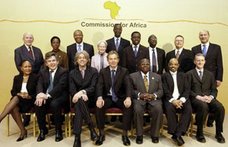The objectives of the Investment Climate Facility for Africa are:
- To build the environment for investment climate reform Encourage, develop, and
work with coalitions for investment climate reform. - To get the investment climate right Support governments in creating a legal, regulatory, and administrative environment that encourages businesses at all levels to invest,
grow, and create jobs. - To enhance Africa's business climate imageImprove
- Africa's image as an investment destination through a coordinated effort to publicize improvements in the investment climate.
The facility's priorities areas will be:
- Property rights
- Taxation and customs
- Infrastructure facilitation
- Competition
- Business registration and red tape
- Financial markets
- Labor markets
- Corruption and crime
About the Investment Climate Facility for Africa
The Investment Climate Facility for Africa is a public-private partnership established as an independent trust with a seven-year lifespan, headquartered in Johannesburg, South Africa. The co-chairmen are Benjamin Mkapa, former President of Tanzania, and Niall FitzGerald, Chairman of Reuters. The Board of Trustees includes prominent businessmen and political figures from Africa and beyond. It has been established in close cooperation with the African Development Bank and has been endorsed by the Report of the Commission for Africa (2005), the G8 at Gleneagles in July 2005, and the New Partnership for Africa's Development (NEPAD). Three multinational firms, Shell, Unilever, and Anglo American, have also contributed financial resources. Discussions are underway with other African and international firms to build on this endeavor.
IFC's Role and Strategy in Africa
IFC is the largest multilateral source of loan and equity financing for private sector projects in Africa. IFC's strategy for Africa is to address the development of the region comprehensively, not only through large projects but also by expanding the investment program to target smaller businesses, which constitute the backbone of the African economy.
For larger projects, IFC is increasingly involved in the formative stages of project development, thus expanding its role significantly beyond provision of finance. To improve the overall investment climate, IFC is also focusing its global knowledge and local expertise on reducing the investment constraints faced by the private sector in Africa. IFC's increased emphasis on technical assistance, deriving from the focus on smaller investments, led to the creation of IFC's multidonor Private Enterprise Partnership for Africa in 2005.

